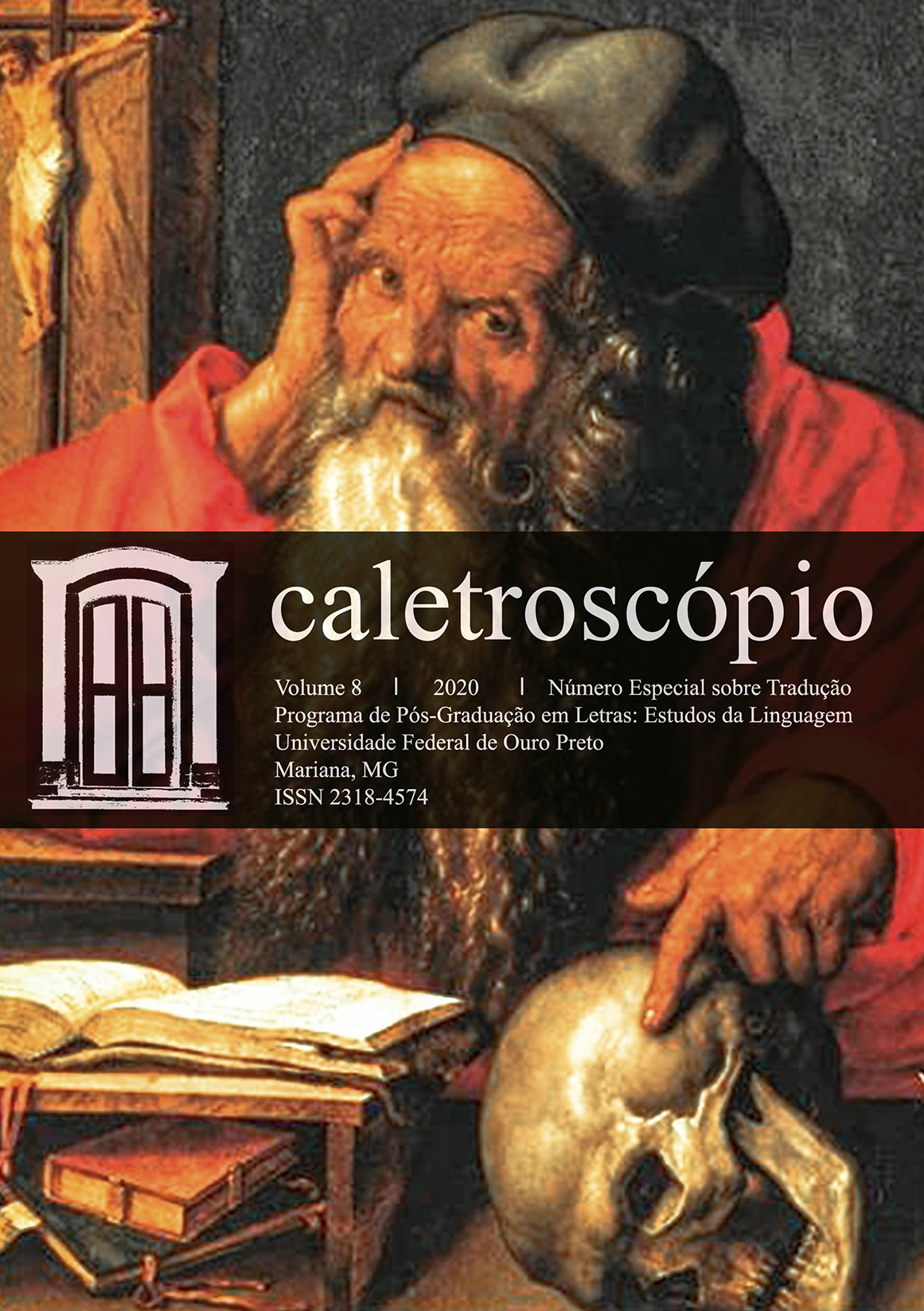Uma investigação empírica do esforço cognitivo despendido para pós-editar metáforas traduzidas automaticamente em comparação com a tradução manual de metáforas
Abstract
This paper reports on a study that investigates the cognitive effort required of a translator either to post-edit machine translated metaphors or to translate metaphors manually by means of eye tracking and keystroke logging. We hypothesise that post-editing will be less effortful than manual translation. In order to test this hypothesis, an experiment was conducted with two different groups of participants. Fourteen participants were asked to post-edit a newspaper text and eight participants were asked to translate the same source text. The analysis focuses on eye-tracking data related to total fixation duration and keystroke logging data (insertions, deletions, pauses). Data analysis shows that the cognitive effort required to post-edit MT output is lower in comparison to manual translation.
Downloads
References
ALVES, F. Tradução, cognição e contextualização: triangulando a interface processo-produto no desempenho de tradutores novatos. D.E.L.T.A., São Paulo, v. 19, n. especial, p. 71-108, 2003.
CARL, M. et al. The Process of Post-Editing: a pilot study. In: SHARP, B.; ZOCK, M.; CARL, M.; JAKOBSEN, A. L. (Eds.). Proceedings of the 8th International NLPCS Workshop: Human-Machine interaction in translation. Copenhague, Samfundslitteratur, 2011. p. 131-142. Disponível em: http://www.mt-archive.info/NLPCS-2011-Carl-1.pdf.
GIBBS, R. W. The dynamic complexities of metaphor interpretation. D.E.L.T.A., São Paulo, v. 26, n. especial, p. 657-677, 2010.
GIBBS, R. W.; TENDAHL, M. Complementary perspectives on metaphor: Cognitive linguistics and relevance theory. Journal of Pragmatics, Amsterdã, v. 40, p. 1823-1864, 2008.
GIBBS, R. W.; TENDAHL, M. Coupling of metaphoric cognition and communication: A reply to Deirdre Wilson. Intercultural Pragmatics, Nova York, v. 8, n. 4, p. 601-609, 2011.
GIBBS, R. W.; TENDAHL, M.; OKONSKI, L. Inferring Pragmatic Messages from Metaphor. Lodz Papers in Pragmatics, Łódź, v. 7, n. 1, p. 3-28, 2011.
GREEN, S.; HEER, J.; MANNING, C. D. The Efficacy of Human Post-Editing for Language Translation. ACM Human Factors in Computing Systems (CHI), Palo Alto, 2013. Disponível em: http://vis.stanford.edu/papers/post-editing.
GUTT, E. Relevance Theory: a guide to successful communication in translation. Nova York/Dallas, Summer Institute of Linguistics and United Bible Societies, 1992.
KRINGS, H. Repairing Texts: Empirical Investigations of Machine Translation Post-Editing Processes. Kent, The Kent State University Press, 2001.
O’BRIEN, S. Machine-Translatability and Post-Editing Effort: an empirical study using Translog and Choice Network Analysis. 2006a. (Tese de Doutorado) Faculty of Humanities and Social Science, School of Applied Language and Intercultural Studies, Dublin City University, Dublin.
O’BRIEN, S. Pauses as indicators of cognitive effort in post-editing machine translation output. Across Languages and Cultures, Hungria, v. 1, n. 7, p. 1-21, 2006b.
O’BRIEN, S. An empirical investigation of temporal and technical post-editing effort. Translation and Interpreting Studies, Amsterdã, v. 2, n. 1, p. 83-136, 2007.
O’BRIEN, S. Eye tracking in translation process research: methodological challenges and solutions. In: MEES, I. M.; ALVES, F.; GOPFERICH, S. (Eds.). Methodology, technology and innovation in translation process research: a tribute to Arnt Lykke Jakobsen. Copenhagen studies in language, 38. Copenhague, Samfundslitteratur, 2009. p. 251-266.
SPERBER, D.; WILSON, D. Relevance: Communication and cognition. Oxford, Blackwell, 1986.
SPERBER, D.; WILSON, D. A deflationary account of metaphors. In: GIBBS, R. W. (Ed.). The Cambridge Handbook of Metaphor and Thought. Nova York, Cambridge University Press, 2008. p. 84-108.
STEEN, G. DORST, A. G.; HERRMANN, B.; KAAL, A.; KRENNMAYR, T.; PASMA, T. A method for linguistic metaphor identification: from MIP to MIPVU. Amsterdã-Filadélfia, John Benjamins, 2010.
UNGER, C. On the cognitive role of genre: a relevance-theoretic perspective. 2001. (Tese de Doutorado) University of London, London, 2001.
The publication Caletroscopio shall retain for a period of three years all authorial rights for works accepted for publication: articles, reviews, translations, etc. Outside this restriction, these works are licenced through Licença Creative Commons-Atribuição-NãoComercial-SemDerivações 4.0 Internacional.
Upon expiry of this period, in the event that the author publishes the text, even when making alterations to the original, we would ask authors to include as a footnote, the information that a previous version of the article was published in the Revista Caletroscópio, citing the appropriate references.


